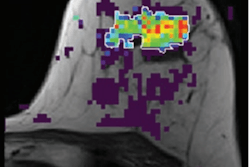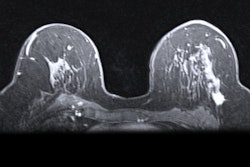
Which breast cancer patients should get preoperative MRI? The answer may not be as clear-cut as some would like to believe. A July 10 study in Radiology: Imaging Cancer found no patient- or tumor-specific factors predicted preoperative breast MRI outcomes.
The large, retrospective study included more than 1,000 breast cancer patients who underwent preoperative MRI to look for additional malignancies. While the study confirmed the benefits of preoperative MRI, the authors didn't find any characteristics linked to additional cancers.
In fact, guidelines that recommend preoperative MRI only for certain patients may result in missed cancers, they noted.
"If these factors are used to exclude older women, women with nondense breast tissue, and women with specific molecular subtypes from undergoing preoperative MRI, these women may not be benefiting from a test that could detect additional disease prior to surgery," wrote the authors, led by Dr. Habib Rahbar, from the department of radiology the University of Washington's Seattle Cancer Care Alliance.
Multiple prominent cancer and breast health societies recommend preoperative MRI for patients with invasive lobular carcinoma, dense breast tissue, or mammography findings suspicious of additional malignancy. However, few studies have had the patient dataset necessary to validate these recommendations.
For their study, the researchers used data from a large regional cancer center in Washington. Unlike most medical centers, the hospital has conducted preoperative MRI scans for about 90% of breast cancer patients younger than 70 since 2005. The authors used their large, long-term dataset to evaluate whether age, breast density, and other factors were linked to additional malignant tumors in breast cancer patients.
A total of 1,396 breast cancer patients underwent preoperative MRI at the hospital between 2005 and 2015. Out of these patients, 419 had at least one additional biopsy based on a preoperative MRI finding, and 181 were ultimately diagnosed with a new malignancy.
Notably, no patient or tumor factors were significantly associated with biopsy-confirmed malignancies found on preoperative MRI. This finding doesn't support limiting the use of preoperative breast MRI just to patients with specific characteristics, Rahbar and colleagues noted.
"We confirm the benefit of preoperative MRI to detect additional cancers but failed to identify which women will benefit most from its routine use," they wrote.
While the model didn't find any positive associations, the authors did find three other significant relationships:
- Patients with dense breast tissue were more likely than women without dense breasts to undergo a biopsy (32% versus 26%) and to have a negative biopsy result (19% versus 14%).
- Patients younger than 50 were more likely than older patients to undergo a biopsy (35% versus 28%) and to have a negative biopsy result (21% versus 15%).
- Patients with Human epidermal growth factor receptor 2 (HER2)-negative cancers were more likely than patients with HER2-negative cancers to undergo a biopsy (31% versus 23%) but less likely to have a positive biopsy result (82% versus 89%).
In addition, the authors created an algorithm to parse the dataset, which also didn't find factors that could predict positive biopsies found on preoperative MRI. Like the statistical model, the algorithm found age, breast density, and HER2 status only moderately predicted patients more likely to have no significant preoperative MRI findings or a negative biopsy result.
"Taken together, results from both multivariate models indicated that age, breast density, and HER2/neu status did not significantly contribute to specific examination-led outcomes," the authors wrote.
Rahbar and colleagues cautioned that their dataset likely included some patient selection bias and slightly overestimated false-biopsy results. Nevertheless, they concluded that their findings don't support using patient- or tumor-level factors for preoperative breast MRI recommendations.
"This study highlights the lack of evidence driving current preoperative MRI expert recommendations and suggests that larger, similar analyses should be performed to help better guide preoperative MRI societal recommendations and practice guidelines," they concluded.



















